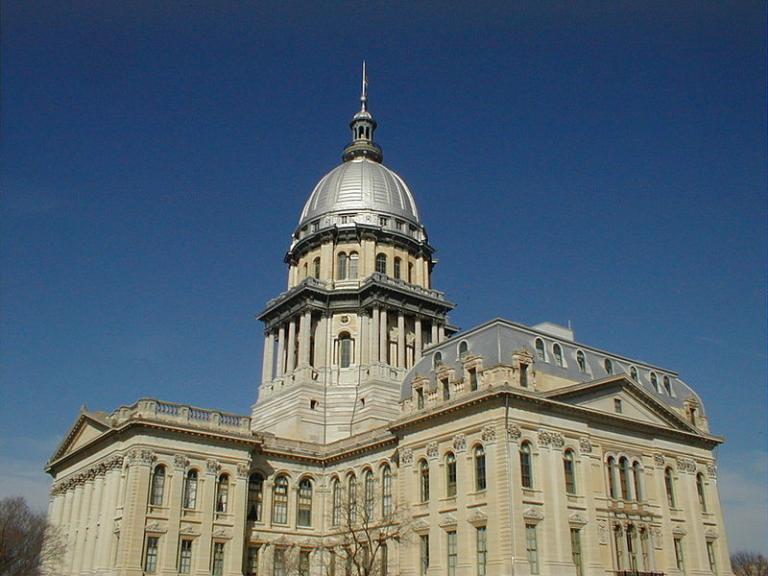
First, the background:
In Illinois, the city of Chicago has long been dominated by Democrats, but most suburbs have not been. Even up to very recently, the state legislators in my area had been a mix of Republican and Democrat, until 4 years ago. Our township trustees had been Republican for who-knows-how-long. And village board elections were non-partisan, or strictly speaking independent, not just “officially” but also in terms of how the elections played out.
This past week saw a set of dramatic reversals. Not only did Democrats take control of the actually-partisan township offices, but the winning village trustee candidates, though nominally-independent, were Democrats, were campaigning as such, had the direct support of local Democratic Party officials, and so on. The same outcomes played out in a number of other suburbs as the Democratic Party and JB Pritzker were quite open about their involvement in local races.
What’s more, the local State House Representatives, though very new, are very actively introducing new legislation, or are co-sponsors, sometimes among small numbers of co-sponsors, for controversial new bill. So for local readers, I’m going to go through the list of bills they’ve sponsored.
First, Nicolle Grasse, from the 53rd district. She was just appointed over the summer, and elected in November. She is a former hospice chaplain and some of her bills reflect this.
As to the bills for which she is the chief sponsor, some of them are fine, and of very little interest. For instance, she has sponsored a bill that would allow individuals to get their marriage license via zoom, with an eye toward helping someone who is hospitalized or in hospice or long-term care. She sponsored a bill that would allow any employee of a hospice company to pick up a patient’s prescriptions, rather than requiring the employee to be a nurse.
Some of them are not concerning individually until you think of the ways they add up to growing state spending and involvement. For instance, she sponsored a bill to create the Task Force on Loneliness Act, which would provide information and propose solutions to the “epidemic of loneliness,” with the Department of Public Health being tasked to do the work. To my understanding, this is going nowhere, since all bills must have been passed through committee by now to be passed this session. (There may be exceptions and some bills might have a companion bill in the State Senate which is making progress.) Another “not going anywhere” bill was a proposal to give college students credit for serving as election judges — a clever idea but a devaluing of higher education.
Looking at all bills for which she is a sponsor and in no particular order:
A bill which would require health insurance to provide an “early egg allergen introduction dietary supplement” and an “early peanut allergen introduction dietary supplement.” These products certainly seem like a fine preventive step, and are available on Amazon for $25 for a 2 month supply – but does the state really need to add endless items to the list of what’s mandatory for insurers to cover, especially when they are not medical care items? This has significant unintended consequences, not only in driving up the cost of insurance through direct expenses and administrative costs, but in shifting employers into choosing “self insured” health care because that’s regulated by the federal government. It could be worse — the initial version demanded that these products be provided without cost-share. As far as status, this one passed through committee, so it’s on its way to becoming law.
An assisted suicide bill. This one appears not to be going to make it out of committee, which is a pleasant surprise, all the more so since House Speaker Welch put his name on it.
A bill mandating coverage for all FDA-approved treatments to slow the progression of Alzheimer’s or other forms of dementia, with the exception that “managed care plans that are under contract with the Department of Healthcare and Family Services” (i.e., Medicaid) are exempt. This seems like a worthy measure but it refers in practice to certain treatments of $300K with very uncertain benefits where there’s controversy around them having been approved by the FDA because the drugmaker seems to have cherry-picked the study results and even Medicare is not covering them. It’s a classic example of not recognizing the complexity of medical costs.
The Health Care Availability and Access Board Act, which would have created a board which would cap the prices of any prescription drug it deems otherwise too expensive. Did not make it past committee.
Another bill would Medicaid for disabled children and adults to pay for “therapeutic recreation” under the “self-directed service model,” which sounds great but is one more instance of states driving up the cost of Medicaid by expanding the scope of what it pays for beyond medical care. Other examples include Medicaid programs providing food and housing as “demonstration projects.” This has been passed through committee because it seems like free money but of course it’s not.
Another bill expands the scope of the Department of Human Service’s gambling disorders program, which is fine but it would sure be better if the state weren’t trying at the same time to get as much revenue from gambling as possible.
The Commission on Youth Sports Act, which would create a commission to promote “the creation of equitable, safe, and sustainable access for youth across the State to participate in sports that meet their skills and match their interests” as well as “the promotion, development, expansion, hosting, and fostering of youth sports, youth sports programs, and youth sporting events and tournaments throughout the State,” which ignores the fact that at the moment there is far too much emphasis on “youth sports” particularly in the form of travel sports and tournaments, and the fact that there really is no need for the legislature to fund anther “study” on their expansion.
Another bill prohibits health insurers from charging out-of-network rates for neonatal care at any hospital. It’s not entirely clear how this is meant to work but it’s an amendment to existing law that says that if an insured person goes to a non-network provider for an emergency, then the insurer either pays the bill in full, negotiates a lower rate, or goes to arbitration for an adjusted rate, and the patient pays based on the in-network provisions (coinsurance percentage, copay amounts) and the ultimate amount billed after negotiation/arbitration. But the amendment in question is simply:
(o) Notwithstanding any other provision of law to the contrary, no health insurer may charge a patient out-of-network rates for neonatal care at any hospital.
There is no clarification that the same arbitration procedures apply, and it pretty much appears as if the bill’s author thinks that insurance companies control hospital costs.
The Homeschool Act was the subject of a prior blog post.
Another bill aims to create “overdose prevention sites,” that is, pilot programs in which drug users inject in a “safe” manner.
The Health Care Transparency Act, which would have mandated (had it not died in committee), among other requirements, that hospitals which do not provide certain services for “nonmedical reasons” (that is, Catholic or other hospitals which do not provide abortion or sterilization services, or hospitals which do not provide mastectomies or hysterectomies to transgender-identifying patients for purposes of “gender affirmation”) must create a disclosure form as a part of the New Patient forms.
The HOPE Pilot Program, which, cleverly hidden in the title, is a psychedelic mushroom decriminalization program. It didn’t pass out of committee. It’s tempting to just roll your eyes at this sort of bill, but it’s still concerning that my town’s supposedly mainstream representative supported it.
Another bill requires that insurance companies include coverage for night guards (that is, to prevent teeth grinding) and retainers (which doesn’t make any sense because that’s an orthodontist’s role).
Yet another bill requires that insurance companies include “medically necessary prescribed vitamins.”
Another bill requires that all public universities and community colleges with student health services programs provide contraception and abortion drugs. The initial version of the bill required that those health centers have referral agreements for health care facilities in the event of complications from those abortion pills, but an amendment removed this requirement. This one passed through committee with one wrinkle: though it appears that when instructions are handed down from party leadership, no Democrat is permitted to vote against a bill in committee, they do occasionally choose not to vote or vote “present.”
So that’s Grasse.
To add to the list, here’s a selection of bills sponsored by Mary Beth Canty, in office since January 2023, when she took a formerly Republican seat after a redistricting.
She is chief sponsor of a bill which would have had the Illinois EPA set energy efficiency standards on a whole host of appliances. (Died in committee, and with a very small number of sponsors.)
She was also chief sponsor to a died-in-committee bill which would have mandated that insurance companies provide to their customers notification of any change in drug pricing.
As to bills to which she added her name but wasn’t the chief sponsor:
The same bills on drug price caps, assisted suicide, the Youth Sports Commission, homeschooling, and video marriage licenses as Rep. Grasse,
plus:
The Enslavement Redress Act. This bill, which did not make it out of committee, would have required all companies doing business with the state, who had any connection to slavery, to make reparations, with the amounts to be determined in their bids.
The RIFL Act, which would require gun manufactures, through a “license” system, to pay the entire cost of firearms injuries and deaths, both to the public health system and costs to victims, including lost wages/lost dependent support and pain and suffering.
Did Canty truly believe these two bills should have been passed and there should have been slavery reparations and that gun manufacturers should pay up for victims’ pain and suffering? Did Grasse truly want to decriminalize mushrooms? Did both of them truly want a new system of drug price caps? Or is it understood that these bills won’t pass? But if that’s true, what’s the purpose? Is it just about building alliances with those bills’ sponsors? And, if so, why would the chief sponsors of extreme legislation have enough power that it’s necessary to curry favor with them?










